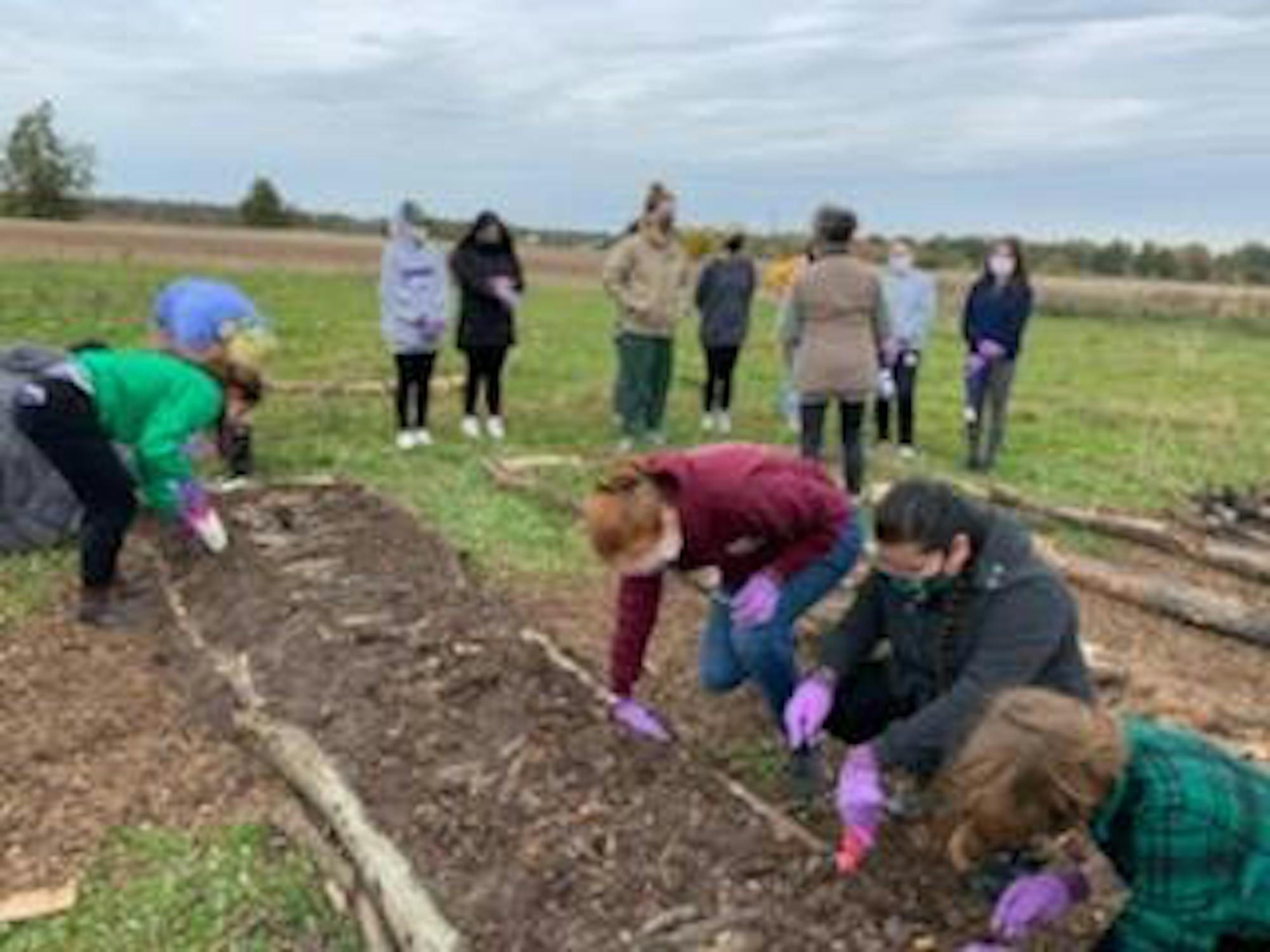Last Friday, Saint Mary’s Going Green Committee and the Farm Group hosted the inauguration of the College’s new sustainable farm. The farm is located on the north side of campus near the athletic fields.
To begin the event, College President Katie Conboy welcomed attendees and expressed her excitement about the farm’s completion, as well as the project’s cooperation with the Sisters of the Holy Cross.
“We are so pleased to be working and farming the land that has meant something to the Sisters for a very long time,” Conboy said.
She then introduced English professor Chris Cobb who explained the significance of the farm as well as how it will benefit the College.
“[The farm] is two acres being used to grow produce sustainably using compost from the dining hall as a fertilizer for food that is going to be grown at the site and that students are going to eat,” Cobb said.
Attendees were then invited to walk over to the site of the compost pile and the sustainable farm.
Senior Ana Martinez discussed how the compost for the farm was generated. She said since the spring of 2017, the College’s compost crew had saved over 30,000 pounds of food to be used for the farm.
Cobb then explained that the farm would begin as a series of raised beds and would continue into the recently acquired field adjacent to them.
In a follow-up interview email, Cobb said the farm had been in the making for the last five years.
“The project began out of conversations on campus around food, sustainability, education, and spirituality that were sparked by programming created by the Center for Spirituality under Elizabeth Groppe’s direction in 2014 to 2015,” Cobb said. “Around August of 2015, a group of 5 or 6 people got together to have a conversation about what it would take to establish a sustainable farm at Saint Mary’s, and the project unfolded from there.”
According to Cobb, setting up the farm was a multi-stage process. After creating a business plan, the group had to prepare the land, find an interested farmer to work with them, and obtain the funding to keep the project going.
Cobb explained how the farm sets itself apart by being ecologically and economically sustainable.
“Ecologically, [sustainable farming] improves the soil, sequesters carbon, and fosters biodiversity while providing healthy, nutritious food to people,” he said. “Economically, it will provide a living for a farmer working the land sustainably through the sale of produce and by providing hands-on environmental education opportunities. By being sustainable in both these ways, the farm should be able to continue indefinitely on the land where it is situated while maintaining the health of the land, the people who work it and the people who eat from it.”
Cobb noted that the farm can be used by a variety of communities now that it is open.
“The farmer, Saint Mary’s classes, students and faculty who do research or volunteer, and members of the local community can use the farm,” he said. “The farmer, with assistance from interested members of the Saint Mary’s community will maintain it. The College will be responsible for maintaining the buffer zone around the sustainable farm.”
Cobb explained the dangers of unsustainable farming to soil fertility and crop production.
“Unsustainable farming practices damage the land being cultivated through loss of topsoil and damage to the microbiotic communities that maintain soil fertility,” he said. “When land becomes too damaged to grow food crops, it is lost as farmland. Since our lives depend on food grown on farms, using up the land on which we can grow food is a very serious, long-term problem.”
In Cobb’s opinion, sustainable farming is the solution to the shrinking amount of cultivable farmland in the world.
“The world is running out of suitable, uncultivated land, and converting all that land to agriculture is devastating for biodiversity, on which human health also depends,” he said. “Sustainable farming, then, is essential to a healthy future for our human civilization... The work we are doing at Saint Mary’s is a very small part of this larger, essential project of protecting agricultural land, the human food supply, and global biodiversity by transforming unsustainable industrial agriculture into a sustainable agriculture system.”
Junior Lindsey Shank spoke about how she got involved in the farm this year.
“I am really just getting involved with the start of the farm this year in my Sustainability position for Student Government, besides participating in compost maintenance in previous years, but I am passionate about agro-ecology, so it has all been super exciting,”
Shank looks forward to the possibilities that the farm now offers the community.
“Having a sustainable farm on campus is so exciting, because there are great opportunities for ecological research and hands-on learning for students,” Shank said. “In addition, the farm provides us an opportunity to use the organic food waste we produce in the dining hall for compost, which ultimately reduces our carbon footprint as a campus.”













